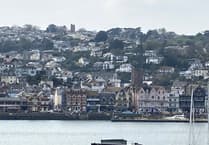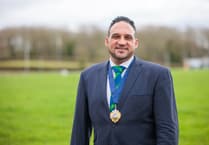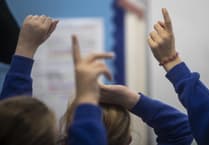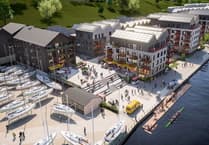FORMER Spotlight TV presenter Justin Leigh gave the opening talk at the first Dartmoor Edge Literary Festival which was held last weekend at the Clay Factory, writes Richard Harding.
He told me he first got into broadcasting at Truro Hospital Radio but had been interested as far back as six years old as a schoolboy. He says: “They dropped me right in at the deep end and I was presenting a programme within a couple of weeks.”
It wasn’t long before he started getting work experience at BBC Radio Cornwall and when he’d finished his A Levels a presenter left and he took over his programme and he spent 10 tears there learning all aspects of journalism and broadcasting.
Justin explained: “The BBC had a system back then when you could do five weeks attachment to another department to get experience elsewhere so I asked if I could go to Spotlight because I ultimately wanted to do television.
“So I went up as a reporter and went out covering different stories then came back and didn’t think much more about it. I was doing the breakfast programme at BBC Radio Cornwall.”
They asked him back to Spotlight and initially wasn’t keen but finally decided to go. On day one he was reporting on a flood at Ottery St Mary and his producer phoned him: “He said the presenter Russell Labey was going on leave the week after next and would I present Spotlight?
“It went OK and I became the stand in for a few years until Russell finally left and I became the permanent presenter.”
I wanted to know the big differences he found between television and radio.
”The first thing I found was the lack of control you had in TV,” continued Justin
“When I was presenting in radio I was pressing the buttons and was pretty much in control of the length of interviews although you still had to hit various points on the clock but there was a bit more freedom and flexibility.
“When I went to television I was at the end of a chain of people. I was directed in my ear at what to do next and which camera to look at next. I had to get used to not having that ultimate control.
“Like a swan we had to look calm and collected and in control but beneath the surface everybody else was paddling like mad.”
There was another big skill Justin needed to learn, the talkback.
“We had a thing called ‘open talkback’ which meant our earpiece was open to the gallery (control room) all the time which meant regardless of whether you’re speaking or not you can hear people talking in your ear all the time.
“Those were instructions to the sound operator, to cameras, the director would be speaking to an outside broadcast and the producer might chip in with a comment about the running order and then there would be a separate voice with all the timings. A constant counting down.”
There are a couple of things that he particularly remembers about the South Hams.
“There was a thing where you could get round on various forms of transport. We set off from Kingsbridge and I took a boat down to Dartmouth. I then got the steam train (from Kingswear) to Paignton.
“We used as many forms of transport as we could all within the South Hams - ferry train, pleasure boat… Also I do a bit of canoeing in my spare time and we decided to show the River Dart from a canoe. I paddled down and we went along past the Sharpham vineyard and down to to Dartmouth and it was beautiful.”
After almost 20 years Justin left the programme in October 2020, something he does have regrets about.
“There were many changes going on in the BBC especially connected with Covid and to ensure resilience in the team I was presenting every other night and would alternate (with Victoria Graham), he said.
“The BBC decided they wanted to continue with only one presenter and far fewer people working on the programme for financial reasons.
“I decided that was the time for me to step down. I could have applied to stay and I thought about it long and hard but I felt the programme would go in a different direction with the changes that were proposed and the loss of banter between the presenters and fewer people behind the scenes to support us.”
Justin’s last programme was an emotional affair: “It was incredibly difficult I always knew it would be and so I had said to my boss in the run up that I only wanted 20 seconds to say goodbye.
“Normally we had 10 seconds on a standard programme after the weather. As it got closer the boss said we’d like to do a bit more of a farewell and include a film of your highlights and include some messages from viewers.
“It was a huge surprise when I saw not just regular viewers but famous people who were viewers of Spotlight so Sir Tim Rice singing to me, he lives in Cornwall most of the time, Julian Fellowes the writer who created Downton Abbey lives in Dorset, Martin Clunes the actor lives in Dorset.
“It was overwhelming and it was also afterwards when I was inundated with e-mails and letters from viewers who told e how much the programme had meant to them. Spotlight was the most watched programme in the South West of England.”
What is Justin doing now?: “I’ve been doing some lecturing, helping train the next generation of journalists and broadcasters at Marjon University in Plymouth.
“When I speak to them, and they’re 18 and 19 year olds, they don’t watch television at all and that’s why the BBC has to change. We don’t all wait for 6.30pm to watch the news, it comes to our phones anytime of the day.
“I’ve been back on BBC Radio Cornwall first doing a couple of shows last year but now I’m filling in regularly. I did the commentary for the National Firework Championships in Plymouth which are streamed around the world on YouTube.”
And of course he also finds time to write a bi-weekly column for our sister title The Cornish Times.
Finally as we were at the Dartmoor Edge Literary Fest I wondered if Justin had ever considered writing a book:? “Do you know I have. My wife writes and is here today with her books. Part of my job on Spotlight was to write a lot of my own scripts and the headlines and I always loved playing with words.
“I’m not sure I’ve got the patience to write a book though. I‘ve seen my wife doing it and the rewrites and coming up with ideas and changing characters.
“It’s a long process and being on live television and radio for so many years I’m used to spending the day on a programme then it’s done, finished, gone and move on to the next one. I have some ideas based on my life and experiences so you never know!”




